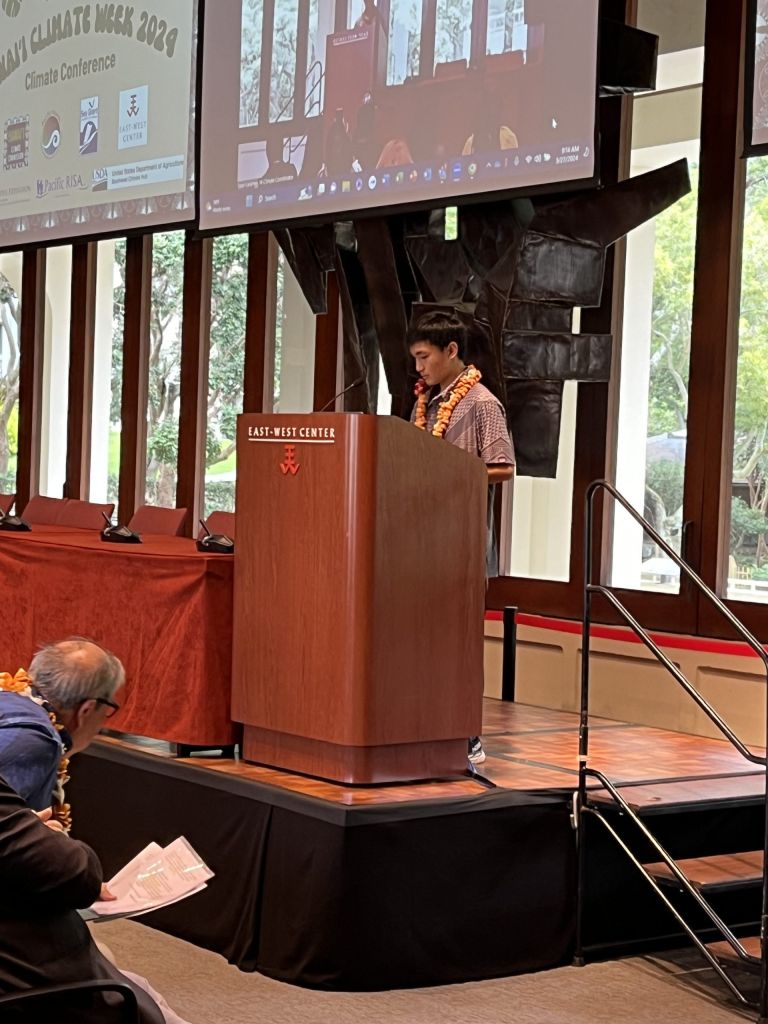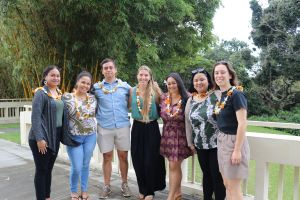Climate conference showcases actionable science
April 1, 2024
“I invite all the adults in the room to take action and think with the same sustainable mindset of many who came before us. I also invite you to let your youth know that they have a huge responsibility on their shoulders.” -Mason Fong

Mason Fong, freshman at Kamehameha Schools Kapālama and Hawaiʻi Sustainable Development Goals Youth Council member, kicked off the 2024 Hawaiʻi Climate Week with inspirational testimony on his vision for Hawaiʻi. Standing on the stage at the Imin International Conference Center at the East-West Center, Mason spoke about cultivating selfless attributes and how actions create ripples of impact. He revealed how he and his peers were part of the Hawaiʻi delegation that visited the United Nations last year. During their visit, they met with the United States Ambassador to the United Nations, Linda Thomas-Greenfield, presenting their cultural perspective and how they felt Hawaiʻi is leading in sustainability on an international stage. Their message impacted the Ambassador, saying that she “now saw nations not as victims in climate change, but as leaders.” Fong’s words crystallized a key lesson from the conference: citizens of all ages and demographics have a role to play in combating the potentially devastating impacts of climate change.
The conference, which ran from March 26 through 29, was packed with speakers, including Governor Josh Green, Malia Nobrega-Olivera, and a keynote speaker, Dr. Jane Lubchenco, the White House Office of Science and Technology, Deputy Director for Climate and Environment. Panels included a comprehensive overview of the Fifth National Climate Assessment (NCA 5) and a discussion with local farmers on the effects of local food production on community relationship building, health, and wellness. A movie screening of the documentary Keeper of the Bay and side quests to interactive gatherings like an on-site workday restoring Puʻulani rounded out the conference’s itinerary.

On Mar 28, the Pacific Island Climate Adaptation Science Center (PI-CASC) hosted the PI-CASC Graduate Scholars Symposium, which featured students presentations that distilled insights and processes from their research projects. Topics included sea-level rise impacts on wastewater infrastructure and water quality, using the oral histories of Marshallese and Yapese voyaging to support the development of community engagement for sustainable sea transport, and utilizing species distribution modeling to select restoration species in Hawaiʻi’s forests.
One presenter, Konapiliahi Dancil, described his motivation for pursuing a career in climate science research during his introduction. “I was born and raised here {Hawaiʻi} with an immediate appreciation for the outdoors. I love surfing, hiking, and fishing…,” said Dancil. “Now that I’m older, I really want to work toward protecting these systems for the next generation.”
Following the Symposium, scholars and student guests were invited to a catered lunch and networking event.
Throughout the conference, the Hawaiʻi Climate Week organizers encouraged participants, including students, scientists, educators, government officials, land resource managers, and community knowledge holders, to participate in an information and knowledge exchange about climate change adaptation and mitigation activities ongoing in Hawaiʻi. They were encouraged to think about their top priorities for climate action. Notes were taken in each discussion and will be used by the State Climate Commission to further their work on climate action.
“Yes, we have a lot more challenges to overcome, but if we start to take action now and instill those values into our hearts, change will happen a lot faster.” -Mason Fong

